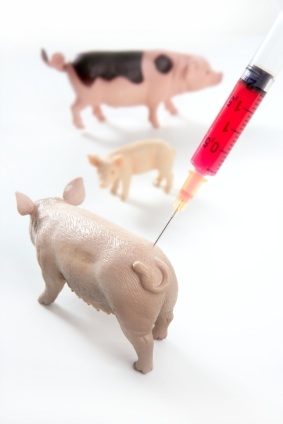ANH looks at the US & UK H1N1 vaccine program
Source: Daniel Martin, Mail Online, 13th November 2009
Doctors are in line for huge bonuses if large numbers of their patients sign up for swine flu jabs.
Managers at a major health trust are offering extra payments on top of the £5.25 that GPs already get per injection.
If they vaccinate more than 90 per cent of those deemed at risk of the disease in their area, they will get 50 per cent more per jab - £7.88 per person.
An uptake of just 40 per cent will earn doctors an extra 10 per cent.
The extra payments are being offered by Heart of Birmingham primary care trust, according to Pulse magazine.
It is not known whether the bonuses, which would be worth thousands of pounds per practice, are available elsewhere in the country.
Last night, critics expressed outrage that GPs were getting yet more money for effectively pushing drugs on to their patients.
They said medics should not be given extra rewards simply for doing their jobs.
Doctors insist the money will go towards overtime and the extra staff needed to give the jabs.
Click here to read the full article.
ANH Comment
We understand that this has sparked some outrage, and it is easy to see why. There are, of course, mega-profits involved in the manufacture and sale of pandemic vaccines. But when the profit motive enters the doctors surgery in this way, any reasonably switched on patient would surely begin to see the doctor in a different light. The trusted doctor might… well… just might make a decision based on profit rather than the patient’s best interests. Can it really be right that a primary care trust (PCT) offers such incentives?
There appears currently no need for such incentives in the US where those (who have been made) desperate to be vaccinated are struggling to find supplies, and distribution problems are occurring. Vaccines cleared for use by the US Food and Drug Administration include those from Sanofi-Aventis SA, CSL Ltd, Medimmune and Novartis AG, and more recently, GlaxoSmithKline, which hopes to deliver an adjuvant-free vaccine (required by the US) by the end of the year. Despite the long lines, it was reported at the end of October that some US doctors are undecided about whether to recommend the vaccine. A recent poll revealed that only about 50% of US citizens want to be vaccinated.
In the UK, where the number of people contracting the virus was said to have dropped this week from 84,000 to 64,000, GlaxoSmithKline’s Pandemrix vaccine has already been given to a number of population groups, though it has been reported that ongoing clinical trials are being watched closely to help ascertain what the ‘correct dosage’ should be for the different groups. It seems that the dosages cannot yet be agreed, and that they may yet be subject to change, because the trials have not yet been underway for long enough to be able to obtain complete data about the immune response of the test subjects over a period of time. The ongoing trials and this ‘lets see how we go?’ approach are quite likely to further undermine trust in the vaccine.
The most recent situation update from the World Health Organization (WHO) would suggest that the peak rate of infection may have been achieved in this second wave of the pandemic in the northern hemisphere. Things are relatively quiet in the southern hemisphere. The WHO have advised all countries administering the H1N1 vaccines to conduct intensive monitoring for safety, and to report adverse events.
Many countries already have systems in place for this, and some countries make these available to the public. It remains to be seen if there will be widespread public trust, or distrust, of government data however. In the UK adverse effect data associated with the H1N1 vaccine is available on the Medicines and Healthcare Regulatory Agency (MHRA) website. In the US, it is co-sponsored by the Centers for Disease Control and Prevention (CDC) and the Food Drug Administration (FDA).
When it comes to vaccinating, everyone needs to be able to make a properly informed choice. In order to be able to do this, we need accurate and transparent information about what the actual risks are — and it is apparent now that governments and vaccine manufacturers are intent on giving us a distorted picture of what is actually known.
People also need information on options available if they don’t want the vaccine, something governments and health authorities are being very tight-lipped about.
There’s plenty of credible information in the public domain on dietary and lifestyle regimes that can help support your immune system, and it may include (this is not an exhaustive list):
- Eating a balanced, healthy diet with plenty of unprocessed whole foods, fruits and vegetables
- Getting plenty of sleep
- Hydrating properly with clean (unfluoridated) water (approx. 2 L daily, drunk little and often)
- Exercising regularly (for those of appropriate health and fitness: moderate/intense exercise for at least 45 mins, 3 times a week)
- Supplementation with nutrients: 2000-4000 IU (50-100 mcg) vitamin D3 daily assuming no significant sunlight exposure; n-acetyl cysteine (NAC), 600 mg twice daily; zinc (25 mg/day) as liquid supplement or lozenges taken away from meals; vitamin C, 500-1000 mg every 3 hours; beta-glucans from reishi/maitake/shiitake mushrooms, etc. If you are in doubt about natural immune support protocols, seek advice from a qualified nutritional and/or herbal medicine practitioner.
Download ANH report on avian influenza which includes considerable amounts of information on natural products which have been shown to help support the immune system.
For further information about the swine flu, HPV and MMR vaccination, please see our Vaccine Choice campaign.
Return to homepage








Comments
your voice counts
There are currently no comments on this post.
Your voice counts
We welcome your comments and are very interested in your point of view, but we ask that you keep them relevant to the article, that they be civil and without commercial links. All comments are moderated prior to being published. We reserve the right to edit or not publish comments that we consider abusive or offensive.
There is extra content here from a third party provider. You will be unable to see this content unless you agree to allow Content Cookies. Cookie Preferences